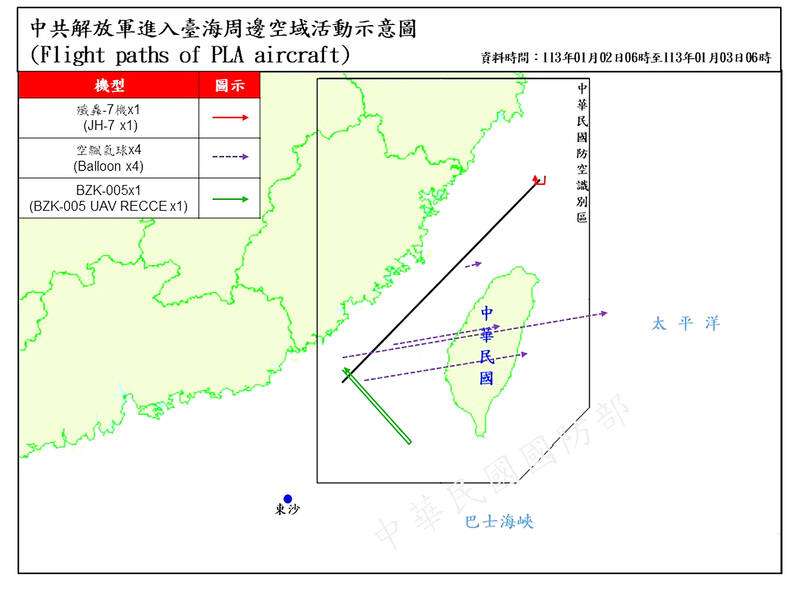Four Chinese balloons on Tuesday drifted across the Taiwan Strait, with three of them crossing over Taiwan proper, the Ministry of National Defense said yesterday, following two more sightings the day before.
Tuesday’s balloons all drifted northeast and disappeared at 10:48am, 5:18pm, 7:01pm and 7:02pm, the ministry said.
They were floating at altitudes of 3,658m, 5,486m, 6,706m and 7,315m respectively, it said, adding that it was the ninth time Chinese balloons had been detected since last month.

Photo courtesy of the Ministry of National Defense
On Monday, two balloons were sighted, one of which crossed over Taiwan proper.
Ministry spokesman Sun Li-fang (孫立方) did not say whether the military believed the latest balloons were for weather or espionage purposes, but the ministry has previously said that most Chinese balloons flying in the area were weather balloons.
The military closely monitors the balloons’ movements and informs civil aviation authorities, Sun said.
“The nation’s armed forces respond appropriately to unidentified balloons found entering Taiwan’s airspace based on the level of threat they pose to national security,” he said, without elaborating.
The ministry last year said that similar devices had been regularly detected around Taiwan, most often between the months of December and February, as seasonal winds bring the balloons closer to Taiwan.
The military does not believe the balloons are directly related to Taiwan’s presidential and legislative elections, to be held on Saturday next week, Sun told a ministry news briefing on Tuesday last week.
Ou Si-fu (歐錫富), a research fellow at the Institute for National Defense and Security Research, said that the balloons are “for military coercion and psychological warfare.”
“The presidential election is coming and balloons are a kind of military intimidating tool,” he said, adding that China wants more “pro-Beijing votes.”
In the 24 hours ending at 6am yesterday, the ministry also detected nine Chinese People’s Liberation Army aircraft and four navy vessels operating near Taiwan.
Two of the aircraft — a Xian JH-7 bomber and a Harbin BZK-005 reconnaissance drone — crossed the median line of the Taiwan Strait into the nation’s north and southwest air defense identification zone, the ministry said.
Beijing has in the past few years ramped up military and political pressure on the government of President Tsai Ing-wen (蔡英文), and also refused to engage with her during her tenure.
It has sent an unprecedented number of warplanes and naval vessels around Taiwan, dubbed by military experts as “gray zone” tactics designed to intimidate Taiwanese.

PREPAREDNESS: Given the difficulty of importing ammunition during wartime, the Ministry of National Defense said it would prioritize ‘coproduction’ partnerships A newly formed unit of the Marine Corps tasked with land-based security operations has recently replaced its aging, domestically produced rifles with more advanced, US-made M4A1 rifles, a source said yesterday. The unnamed source familiar with the matter said the First Security Battalion of the Marine Corps’ Air Defense and Base Guard Group has replaced its older T65K2 rifles, which have been in service since the late 1980s, with the newly received M4A1s. The source did not say exactly when the upgrade took place or how many M4A1s were issued to the battalion. The confirmation came after Chinese-language media reported

A Ministry of Foreign Affairs official yesterday said that a delegation that visited China for an APEC meeting did not receive any kind of treatment that downgraded Taiwan’s sovereignty. Department of International Organizations Director-General Jonathan Sun (孫儉元) said that he and a group of ministry officials visited Shenzhen, China, to attend the APEC Informal Senior Officials’ Meeting last month. The trip went “smoothly and safely” for all Taiwanese delegates, as the Chinese side arranged the trip in accordance with long-standing practices, Sun said at the ministry’s weekly briefing. The Taiwanese group did not encounter any political suppression, he said. Sun made the remarks when

The Taiwanese passport ranked 33rd in a global listing of passports by convenience this month, rising three places from last month’s ranking, but matching its position in January last year. The Henley Passport Index, an international ranking of passports by the number of designations its holder can travel to without a visa, showed that the Taiwan passport enables holders to travel to 139 countries and territories without a visa. Singapore’s passport was ranked the most powerful with visa-free access to 192 destinations out of 227, according to the index published on Tuesday by UK-based migration investment consultancy firm Henley and Partners. Japan’s and

BROAD AGREEMENT: The two are nearing a trade deal to reduce Taiwan’s tariff to 15% and a commitment for TSMC to build five more fabs, a ‘New York Times’ report said Taiwan and the US have reached a broad consensus on a trade deal, the Executive Yuan’s Office of Trade Negotiations said yesterday, after a report said that Washington is set to reduce Taiwan’s tariff rate to 15 percent. The New York Times on Monday reported that the two nations are nearing a trade deal to reduce Taiwan’s tariff rate to 15 percent and commit Taiwan Semiconductor Manufacturing Co (TSMC, 台積電) to building at least five more facilities in the US. “The agreement, which has been under negotiation for months, is being legally scrubbed and could be announced this month,” the paper said,